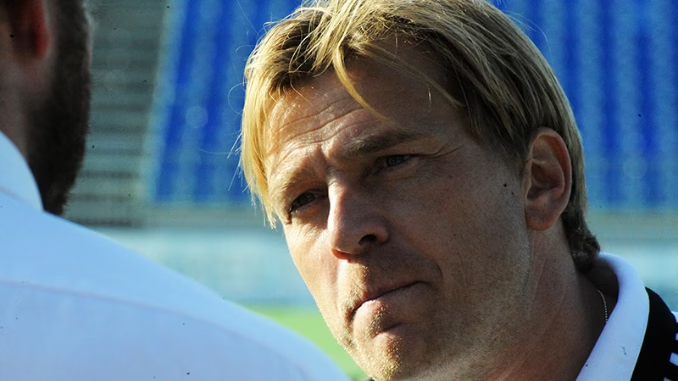
Is Tony Gustavsson the coach to finally lead the Matildas to a medal? Photo: Flickr - Anders Henrikson CC BY 2.0 Cropped.
“This is the time to talk about the spirit in this team … I mean, what a group of players this is, they’re so amazing,” said Tony Gustavsson after a nail-biting, nonsensical victory against Zambia on Monday morning.
Requiring a moment to catch his breath after a pulsating and captivating rollercoaster beyond epic proportions, the Swedish tactician understood the gravity of the situation.
His players had just pulled him out of the graveyard.
But is Gustavsson more of a tactician, or a motivator? The ‘belief’ mantra attached to this Matildas class is partly down to the manager’s undeniable ability to galvanise a group of talented individuals and buy into the ‘never say die’ spirit instilled in Australia’s sporting culture.
Pointing toward a sign above the office door reading ‘Believe’, Ted Lasso is well-known for his calm aura and inspirational words of wisdom that made his Richmond players run through a brick wall despite accumulating minimal knowledge about the game.
Obviously, Gustavsson was not hired from an average American college football team and has earned his coaching badges. But at the same time, he enchants similar vibes.
He says all the right things and possesses a particular demeanour that can get any message across with conviction. The players look up to him. However, this isn’t a movie. More than just spirit and a refuse-to-surrender mentality is needed to overcome further potential heartbreak – and unfortunately, it’s leaning that way again.
Time and time again, the 50-year-old has made head-scratching decisions that have forced fans to leap up off their couches and pull out their hair in despair.
The list is endless. Take last year’s World Cup for example. Ridiculously late substitutions, limiting Alex Chidiac’s minutes and hoofing long balls over the top to Alannah Kennedy against Nigeria had many calling for his head, until a flawless 4-0 scalp against Canada kickstarted a historic semi-final run and covered the cracks.
Still, late changes have been the norm these opening two games in Paris. Despite being completely outplayed in the first half by the Germans, Gustavsson stared at the opposition bench making the first substitute of the match.
Inexplicably, he threw out a system that was working – a transition into a 3-4-3 in possession setup, that allowed the midfield to overload and provide the license for Ellie Carpenter to drift inside and dominate the right half-space.
And then the baffling decision to start Michelle Heyman on the bench in consecutive matches after featuring in almost every fixture leading into the Olympics – registering five goals during the qualifying campaign. It took a 3-0 defeat to Germany and trailing 2-5 to Zambia to realise the Matildas were crying out for a natural centre-forward.
Gustavsson is a reactive coach, not a proactive one. He has his limitations. That is the cold hard truth.
Defensively, the Matildas are in crisis, the back five that kept four clean sheets in the World Cup, suddenly seem a shadow of themselves (albeit Kennedy and Carpenter are prone to having a mistake in them).
Five goals conceded on set pieces already in Paris should also signal alarm bells. How is Gustavsson preparing his team exactly?
The inability to make simple passes and keep possession against a nation ranked 64 in the world is a concern. That aspect is not down to preparation, but rather skill errors which to be fair to Gustavsson, he cannot control on the pitch.
Attention now turns to another do-or-die clash against the United States who Australia have only beaten once in 37 meetings. One point should be enough to advance, yet that could be a disfavour.
Unless Gustavsson can turn around the Matildas’ defensive misfortunes in less than 48 hours with a magic wand, playing for a draw should not be the objective. They must play to their strengths and utilise their attacking talent against a vastly improved but vulnerable USA outfit.
Guaranteed progression to the quarter-finals but not officially pencilled in for top spot in Group B, USA coach Emma Hayes could opt for some fresh legs, or at least as much rotation as an 18-player squad allows for. The Tillies will take any glimmer of positive news at this point.
With his contract set to expire after the Games conclude, undoubtedly, this is Gustavsson’s most challenging period at the helm – which will determine whether he stays or goes.
The pressure is mounting as each day passes. After consecutive fourth-place finishes at the Tokyo Olympics and the home World Cup, this should have been the best chance for the Matildas to claim an elusive medal given the squad’s experience, Sweden and Great Britain’s exclusion, reigning gold medallists Canada’s off-field issues and a favourable path to the semi-finals.
Instead, the Matildas will need to do it the hard way – just as they did when they qualified as a third-placed team three years ago in Tokyo, and defeated Canada in last year’s final World Cup group stage match in what was a must-win.
Gustavsson must avoid his stubborn ways and stick to the basics of what has worked well during the Olympic qualifying stretch. This is not the time for crazy experiments or out-of-the-blue tactical adjustments.
The former USA women’s assistant will require another miracle to dig himself out of an almighty hole against his old employer.
Is he capable of reading the game accordingly, making timely substitutions, and producing a tactical masterstroke to outsmart arguably the best manager in women’s football? Evidence suggests it is unlikely.
Then again, it may all be part of Gustavsson’s unhinged plan.
